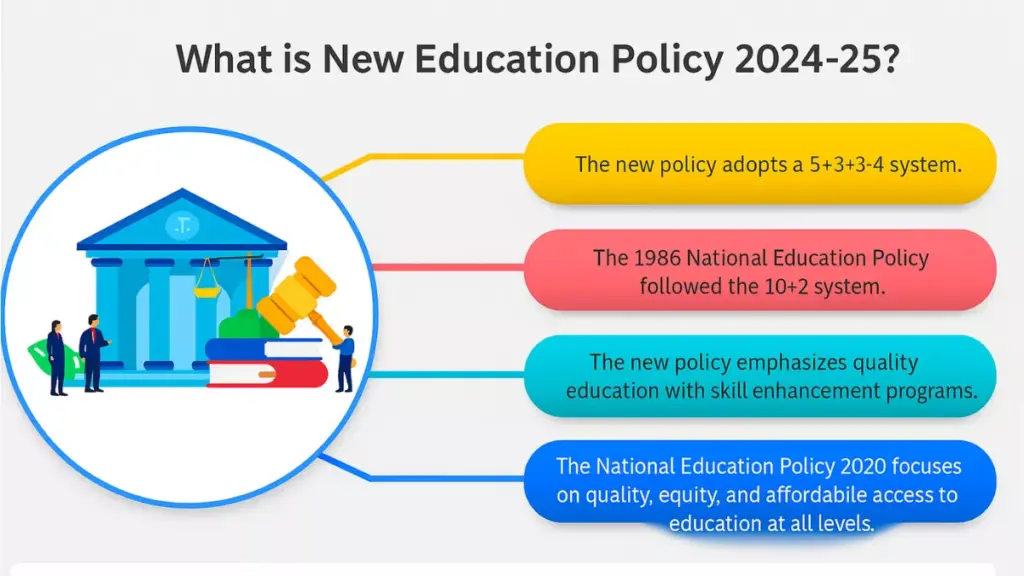National Education Policy 2024: The New National Education Policy 2024 (NEP 2024) brings big reform in India’s education and healthcare systems. Approved by the Union Cabinet of India, it is an extension of the NEP 2020 framework to strengthen holistic learning, skill-based education, and research-driven innovation.
The New National Education Policy (NEP) 2024 revolutionises India’s education system with a focus on healthcare skill development, multidisciplinary learning, and innovation. It aims to prepare a globally competent workforce by integrating medical, nursing, and AYUSH education, encouraging industry collaboration, and enhancing vocational training for a future-ready healthcare sector.

National Education Policy 2024 Vision: Education for a Knowledge Economy
With over 50% of India’s population under 35 years, NEP 2024 sees youth as the nation’s biggest asset. The policy aims to:
- Improve access to quality education
- Promote research, creativity, and innovation
- Introduce flexibility in career and learning choices
- Encourage lifelong learning through skill-based systems
This vision aligns India’s education with the knowledge economy and ensures equitable access for all learners.
Strengthening Medical Education Infrastructure
India’s healthcare education has expanded significantly under NEP 2024:
- 808 medical colleges and more than 1,23,000 MBBS seats
- 75,000 (approx) postgraduate seats across disciplines
- Growth from just 51,348 MBBS seats a decade ago
The policy proposes to upgrade 600 district hospitals into teaching hospitals, bridging practical learning with healthcare service delivery.
Read Also: Medical College Expansion in India: CSS Phase 1-2-3 Explained
New NEP 2024: Key Reforms in Medical Education
Revamping MBBS Curriculum
The new curriculum prioritises:
- Core medical, diagnostic, surgical, and emergency competencies
- A robust rotational internship program
- Enhanced pedagogy and assessment for clinical exposure
These reforms ensure MBBS graduates are skilled, confident, and job-ready.
Integrating Pluralistic Healthcare Systems
NEP 2024 emphasises medical pluralism by integrating AYUSH systems, Ayurveda, Yoga, Naturopathy, Unani, Siddha, and Homoeopathy into mainstream education.
- Foundational courses will be common for MBBS, BDS, Nursing, and Allied Health programs.
- Lateral entry between disciplines will promote a multidisciplinary approach.
This ensures collaborative healthcare delivery aligned with India’s traditional and modern systems.
Read Also: AYUSH vs Allopathy: What Are the Legal & Medical Limits?
Nursing and Allied Health Education Reforms
The NEP introduces major improvements in nursing education:
- Five-year accreditation cycles for nursing institutions.
- Establishment of a National Accreditation Body for nursing and allied streams.
- Recognition of Nurse Practitioner programs across India.
These measures enhance career growth for nurses and address doctor shortages in underserved regions.
Benefits of Multidisciplinary Learning
NEP 2024 promotes multidisciplinary institutions that blend academic knowledge with practical skills.
The success of COVID-19 vaccine development, achieved in just 13 months through collaboration among bioinformatics, chemical engineering, and medical science, serves as a prime example of this approach.
By bridging medicine, data science, and technology, India can accelerate innovation in medical devices, biotechnology, and Ayurvedic biology.
Innovation and Research in Healthcare
The policy promotes research and innovation hubs that encourage cross-disciplinary collaboration.
India aims to reduce dependence on imported medical devices (₹41,000 crore in 2020) by:
- Supporting domestic manufacturing of key medical technologies.
- Strengthening R&D partnerships with industry.
- Advancing Ayurvedic Biology research at the molecular level.
This focus positions India as a self-reliant global health innovator.
Healthcare Skill Development: The NEP Advantage
Skill development is the cornerstone of NEP 2024:
- Integrating vocational training into school and college curricula.
- Promoting technical and soft skills essential for healthcare careers.
- Partnering with industry for internships and practical exposure.
- Updating curricula to reflect emerging technologies like AI and telemedicine.
These initiatives will create a future-ready, skilled healthcare workforce aligned with India’s National Skill Development Mission.
| The National Skill Development Mission (NSDM), launched in 2015, aims to equip India’s youth with employable skills and bridge the gap between industry needs and workforce capabilities. Through coordinated efforts across ministries, states, and private partners, it provides standardised skill training, promotes entrepreneurship, and enhances productivity in key sectors like healthcare, IT, and manufacturing. By improving employability, the mission supports economic growth and global competitiveness. |
The New National Education Policy 2024, part of the NEP 2020 Framework, goes beyond academic reform; it’s a transformational framework for healthcare and skill empowerment.
By integrating education, industry, and innovation, NEP 2024 ensures India’s medical professionals are globally competitive, ethically driven, and socially conscious.
With its focus on “Education for All, Skills for Life,” NEP 2024 is poised to make India a global hub for healthcare innovation and learning excellence.

